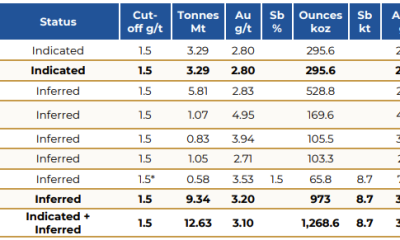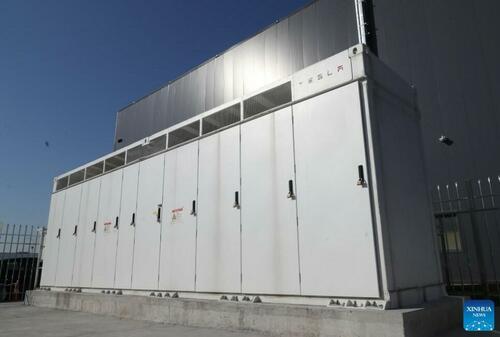Energy & Critical Metals
IperionX to produce titanium plate for aerospace and defence giant Lockheed Martin
Special Report: Lockheed Martin has ordered titanium plate components from IperionX, fuelled by the company’s low-cost, sustainable titanium. … Read…

- IperionX and Lockheed Martin have agreed an order for titanium plate components produced using IperionX’s U.S. manufactured titanium
- Lockheed Martin will evaluate the performance of IperionX’s titanium plate material
- Titanium is a critical material for many U.S. defence systems, however the country currently imports over 95% of its primary titanium metal supply
U.S. aerospace and defence giant Lockheed Martin has ordered titanium plate components from IperionX, to be produced by the company’s U.S. manufactured low-cost, sustainable titanium.
IperionX (ASX:IPX) aims to produce low carbon titanium for advanced industries including space, aerospace, electric vehicles, and 3D printing via an end-to-end business model.
The company says its advanced titanium production technologies have the potential to provide a lower cost and more sustainable U.S. domestic supply chain for titanium raw material.
“This collaboration with Lockheed Martin is another important milestone towards the rapid commercialisation of IperionX’s breakthrough low-carbon titanium technologies,” IPX’s Anastasios Arima said.
“These patented technologies can either use titanium minerals or titanium scrap metal as feedstock to manufacture high quality titanium products at significantly lower cost and carbon footprint than existing production processes.”
Lockheed Martin senior fellow for Additive Manufacturing Processes and Materials Brian Rosenberger said reducing the cost of titanium components “will mean broader use of this material to increase the performance of our products.”
“With this order, Lockheed Martin will perform an initial evaluation of the material quality and mechanical performance of IperionX’s titanium plate material,” he said.
Titanium critical to defence systems
Titanium is prized for its high strength-to-weight ratio, resistance to high temperatures and corrosion, and as such, is a critical material for many U.S. defence systems, including military fighter aircraft and engines, munition and weapon components, naval platforms and military ground vehicles.
Lockheed Martin makes heavy use of titanium alloys for critical structures and other key components across the breadth of its products for air, land, sea, and space.

The United States currently has no commercial domestic primary titanium metal (titanium sponge) capacity, resulting in the country importing over 95% of its titanium sponge requirements, including for the U.S. defence sector, with the titanium sponge market currently dominated by China and Russia.
However, the US government is working to reduce this foreign reliance to strengthen domestic material supply chains through government funding and incentives – which IPX says it will pursue.
Titanium has been mass produced in the same way since the 1940s when the existing ‘Kroll Process’ was developed, which is energy intensive, high cost and produces high levels of greenhouse gas emissions.
In contrast, IperionX’s breakthrough titanium production technologies use less energy to produce high-strength titanium, at lower costs, with zero Scope 1 and 2 emissions.
The company plans to re-shore titanium metal production to the U.S., reduce the acute reliance on titanium imports from foreign nations, and strengthen the domestic titanium supply chain for critical defence systems.
The titanium plate components for Lockheed Martin will be manufactured with powder metallurgy production methods and the company’s advanced titanium angular powder.
To deliver higher performance and durability, the company will also employ its patented Hydrogen Sintering and Phase Transformation (HSPT) technologies, a cutting-edge technique to enhance the microstructure of titanium parts to deliver strength and fatigue properties that are comparable to wrought titanium alloys.
Key development approvals secured for Titan
Earlier this week, IPX secured vital development permits for its Titan project, including the National Pollutant Discharge Elimination System (NPDES) Permit and Surface Mining Permit, which has been issued by the Tennessee Department of Environment & Conservation.
A 2022 Scoping Study also highlighted positive project economics including projected annual EBITDA of ~$117 million, after-tax NPV8 of $692 million, and after-tax IRR of 40%.
IPX says residual regulatory requirements for the development of the Titan project are expected to be complete by the end of 2023.
This article was developed in collaboration with IperionX, a Stockhead advertiser at the time of publishing.
This article does not constitute financial product advice. You should consider obtaining independent advice before making any financial decisions.
The post IperionX to produce titanium plate for aerospace and defence giant Lockheed Martin appeared first on Stockhead.

Uranium Exploration Company Announces Additional Staking in the Athabasca Basin
Source: Streetwise Reports 12/22/2023
Skyharbour Resources Ltd. announced an update from its Canada-based Falcon Project along with additional…
Tesla Launches New Mega Factory Project In Shanghai, Designed To Manufacture 10,000 Megapacks Per Year
Tesla Launches New Mega Factory Project In Shanghai, Designed To Manufacture 10,000 Megapacks Per Year
Tesla has launched a new mega factory…
Giving thanks and taking stock after “a remarkable year”
An end-of-year thank you to our readers, industry colleagues and advertisers before Electric Autonomy breaks from publishing until Jan. 2
The post Giving…










